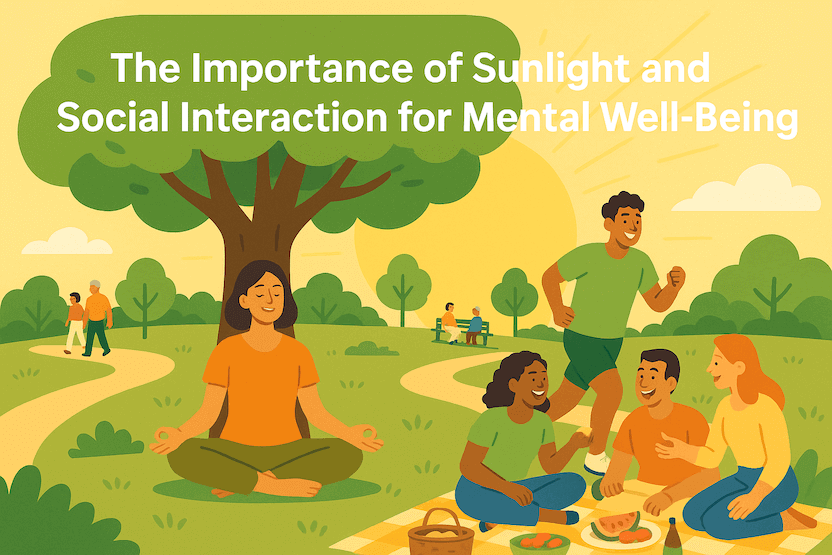Last update: June 22, 2025
5 minute read
The Benefits of Vitamin D: How This Essential Nutrient Supports Your Health and Wellbeing
Discover the power of vitamin D for strengthening bones and lifting your mood. Learn sources, ideal doses, and tips for better health.

By Derick Rodriguez, Associate Editor
Edited by Yerain Abreu, M.S.

Did you know that, despite its sunny nickname, the “Sunshine Vitamin”—Vitamin D—is something about 41% of Americans are deficient in? While it’s best-known for strengthening bones, recent research shows its perks reach far beyond bone health.
From supporting immune defenses to promoting a more balanced mood, maintaining healthy vitamin D levels is critical for overall well being. Because modern lifestyles often limit sunlight exposure, many of us turn to a high-quality vitamin D supplement to bridge the gap.
Key takeaways
- Vitamin D helps calcium absorption, making strong bones and preventing bone diseases
- Adequate vitamin D levels are associated with mood regulation, but current research is mixed and doesn't conclusively show that supplementation reduces depression or anxiety symptoms
- Good vitamin D sources include sunlight exposure, a nutritious diet, and quality supplements
What is vitamin D?
Vitamin D is a fat-soluble vitamin that acts more like a hormone once inside your body. It’s needed for the absorption of calcium and phosphorus, both essential for healthy bones and teeth. This nutrient also supports your immune system, muscle function, and even brain health.
But wait—if vitamin D acts like a hormone, why is it called a vitamin? Historically, it was identified as the dietary factor that prevented rickets. Later research revealed its hormone-like activity, but the name stuck.
Your body naturally produces vitamin D when skin is exposed to ultraviolet (UV) rays. However, spending most of your time indoors, living at higher latitudes, or using sunscreen can limit natural production.
— Dr. Dimitar Marinov, MD, RDN, PhDOften dubbed the 'Sunshine Vitamin,' Vitamin D is crucial for immune function, mood regulation, and overall wellbeing. Given its widespread deficiency due to modern lifestyles, prioritizing adequate intake through sunlight, diet, and judicious supplementation is vital for optimizing health and preventing a range of chronic conditions.

Here’s why that matters: The less vitamin D your skin can make, the more important food or supplements become.
VitaRx Tip
Vitamin D is often called the "Sunshine Vitamin" because your skin can produce it naturally in response to sunlight, making it unique among essential nutrients.
Age Group | Recommended Daily Amount |
|---|---|
Infants 0-12 months | 400 IU (10 mcg) |
Children 1–18 years | 600 IU (15 mcg) |
Adults up to 70 years | 600 IU (15 mcg) |
Adults over 70 years | 800 IU (20 mcg) |
Pregnant/lactating women | 600 IU (15 mcg) |
Still scratching your head about the difference between “IU” and “mcg”? 1 microgram (mcg) = 40 International Units (IU); therefore, 400 IU = 10 mcg.
How does vitamin D support your health?
- Bone & teeth health Vitamin D boosts calcium absorption, lowering the risk of soft or brittle bones. In children, severe deficiency can cause rickets; in adults, osteomalacia or osteoporosis.
- Immune system support: Sufficient vitamin D may help your body fight viruses and bacteria and is linked to a lower risk of autoimmune conditions.
How exactly? Vitamin D may regulate antimicrobial proteins, help fight germs, and manage inflammation.
- Muscle & nerve function: Adequate levels support steady muscle contractions and nerve signaling, lowering fall risk in older adults.
- Mood & cognitive benefits: Low vitamin D levels correlate with a higher risk of depression and cognitive decline as we age.
- Chronic disease prevention: Having enough vitamin D may lower risk for heart disease, diabetes, and certain cancers.
Unit (nmol/L) | Unit (ng/mL) | Health Status |
|---|---|---|
<30 | <12 | Deficiency; possible rickets/osteomalacia |
30≤50 | 12≤20 | Generally considered insufficient |
≥50 | ≥20 | Generally considered adequate for bone health (some experts recommend ≥75 nmol/L or ≥30 ng/mL) |
>125 | >50 | Potential adverse effects |
Table: Serum 25-Hydroxyvitamin D Concentrations and Health
Think of it this way: Staying in the optimal range helps you enjoy all the perks listed above.
Why are so many people low on vitamin D?
Worldwide deficiency is surprisingly common. Limited sun, low-vitamin diets, darker skin (which lowers vitamin D production), and aging all contribute [5]. Survey data show about 73 % of Americans had sufficient blood levels between 2011-2014, leaving a sizeable portion at risk.
But why doesn’t food alone cover our needs?
- Few foods naturally contain substantial vitamin D.
- Many staples only provide small amounts unless fortified.
- Sunlight remains the primary source—making supplements helpful when sun is scarce.
Common factors leading to deficiency
- Limited sun exposure (indoor lifestyle, high latitudes, winter)
- Darker skin pigmentation
- Aging skin
- Obesity (vitamin D gets trapped in fat tissue)
- Malabsorption disorders (Crohn’s, celiac, etc.)
Food sources of vitamin D
Natural sources:
- Fatty fish (salmon, mackerel, sardines)
- Fish-liver oils
- Egg yolks (depends on the method of raising the chickens)
- Beef liver
Fortified sources:
- Milk, orange juice, many cereals
- Plant-based milks (almond, oat, soy, etc.)
Food Source | Vitamin D (IU) |
|---|---|
Salmon (3 oz cooked) | 570 |
Fortified Milk (8 oz) | 95.6 |
Unsweetened Oat Milk | 68 / 100 g |
Almond Milk | 63.6 / 100 g |
Getting enough vitamin D
For many light-skinned adults at mid-latitudes, roughly 10–15 minutes of midday sun on face and arms two or three times a week may help maintain vitamin D levels; individuals with darker skin, higher latitudes, winter months, or sunscreen use often require longer exposure.
If you have risk factors or minimal sun exposure, ask your healthcare provider about a 25-hydroxyvitamin D blood test or potential supplementation.
How do I know if I’m getting enough?
- Blood testing is the gold standard.
- Deficiency symptoms may include fatigue, frequent illness, bone pain, or muscle weakness.
VitaRx Tip
Babies don’t receive enough vitamin D from breast milk alone, so pediatricians often recommend supplementation unless formula-fed.
Feeding Type | Supplement Needed? |
|---|---|
Exclusively breast-fed | Yes |
Fortified formula-fed | Usually no |
Possible risks from too much vitamin D
Although rare, vitamin D toxicity can occur, typically from excessive supplements, not sun or food. High levels can raise blood calcium, causing nausea, weakness, and kidney issues.
How much is too much? For most adults, the upper limit is 4,000 IU (100 mcg) per day; chronic intake above this may lead to toxicity.
VitaRx Tip
Even though vitamin D is called a vitamin, it actually acts as a prohormone, influencing everything from mineral absorption to inflammation and mood.
Frequently asked questions (FAQ)
Here are some of the most frequently asked questions about the benefits of vitamin D.
Final thoughts
Vitamin D earned its “Sunshine Vitamin” nickname for bone health, but its benefits extend well beyond bones—supporting immunity, mood, and more.
Since deficiency is common, ask yourself: Could your body use a vitamin D boost? Get your levels tested and discuss supplementation with your healthcare provider.
Sources and references
- Prevalence and correlates of vitamin D deficiency in US adults - PubMed
- Vitamin D - Health Professional Fact Sheet
- Vitamin D Deficiency - StatPearls - NCBI Bookshelf
- Questions About Vitamin D for Primary Care Practice: Input From an NIH Conference - PubMed
- Benefits of Vitamin D in Health and Diseases - PMC
- Vitamin D and Cancer - NCI
Editor

Derick Rodriguez
Derick Rodriguez focuses on editing health and wellness-related content. With over half a decade of experience in the digital realm, Derick has developed a unique skill set that bridges the gap between complex health concepts and accessible, user-friendly communication. His approach is deeply rooted in leveraging personal experiences and insights to illuminate the nuances of health and wellness topics, making them more approachable and empowering readers with knowledge and confidence.
Editor

Yerain Abreu
Yerain Abreu is a content strategist with over seven years of experience. He earned a Master's degree in digital marketing from Zicklin School of Business. He focuses on medical and health-related content, working with top healthcare professionals to ensure content is engaging and reliable.
At VitaRx, we're not just passionate about our work — we take immense pride in it. Our dedicated team of writers diligently follows strict editorial standards, ensuring that every piece of content we publish is accurate, current, and highly valuable. We don't just strive for quality; we aim for excellence.
Related posts
While you're at it, here are some other relevant articles you might be interested in.

Get your personalized vitamin recommendations in less than
5 minutes.
Get your personalized vitamin recommendations in less than
5 minutes.






